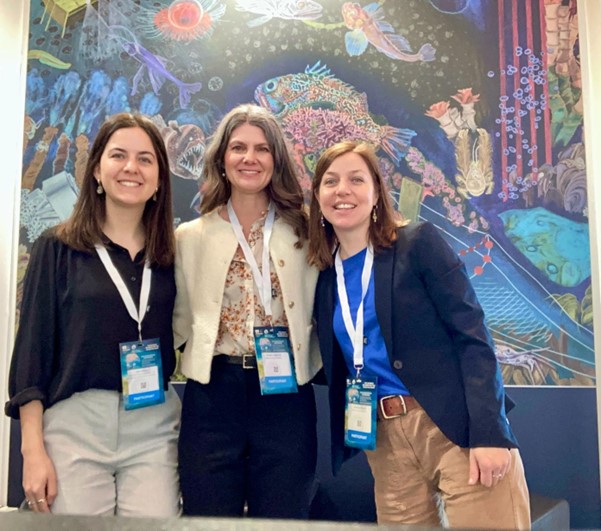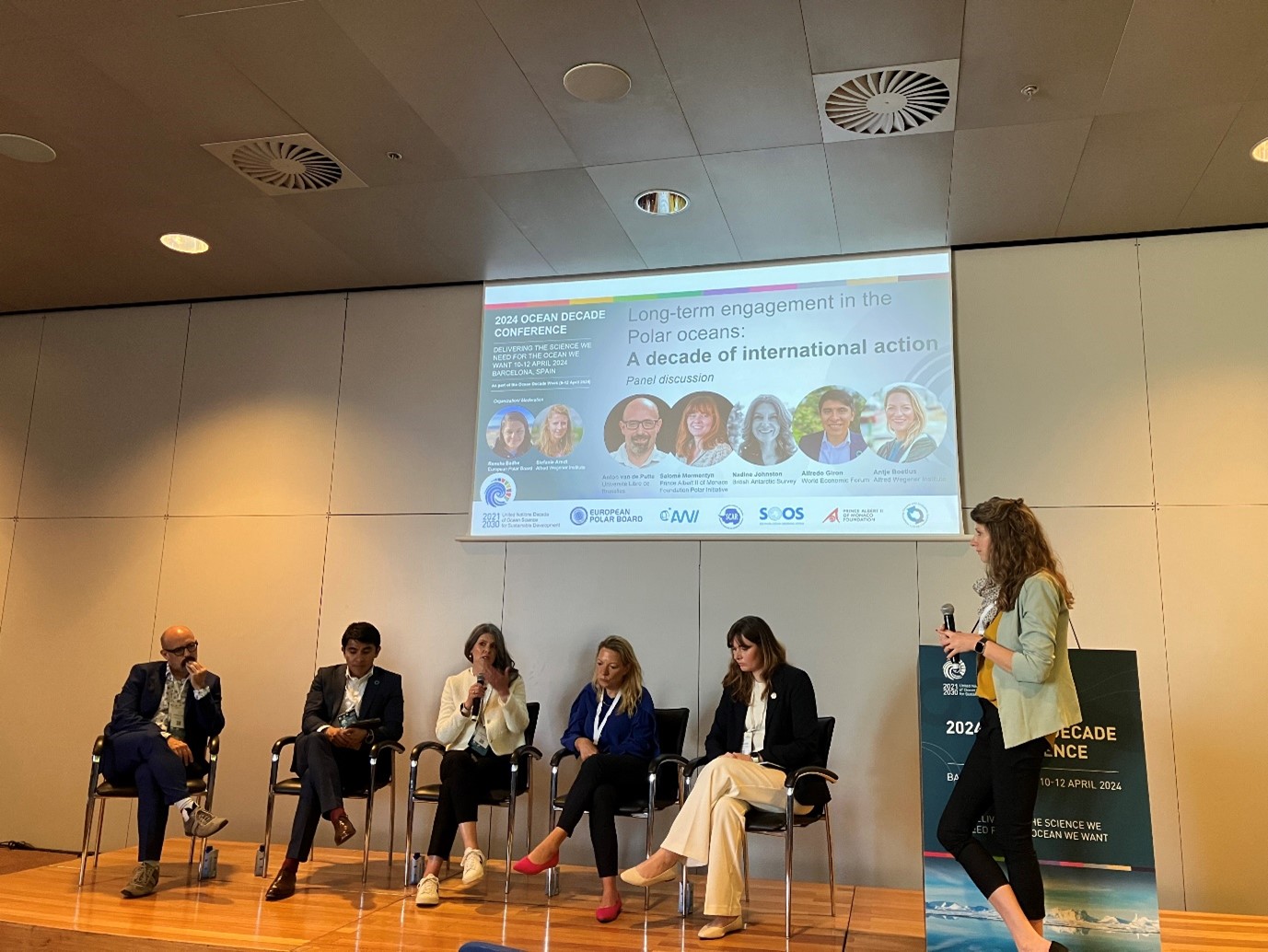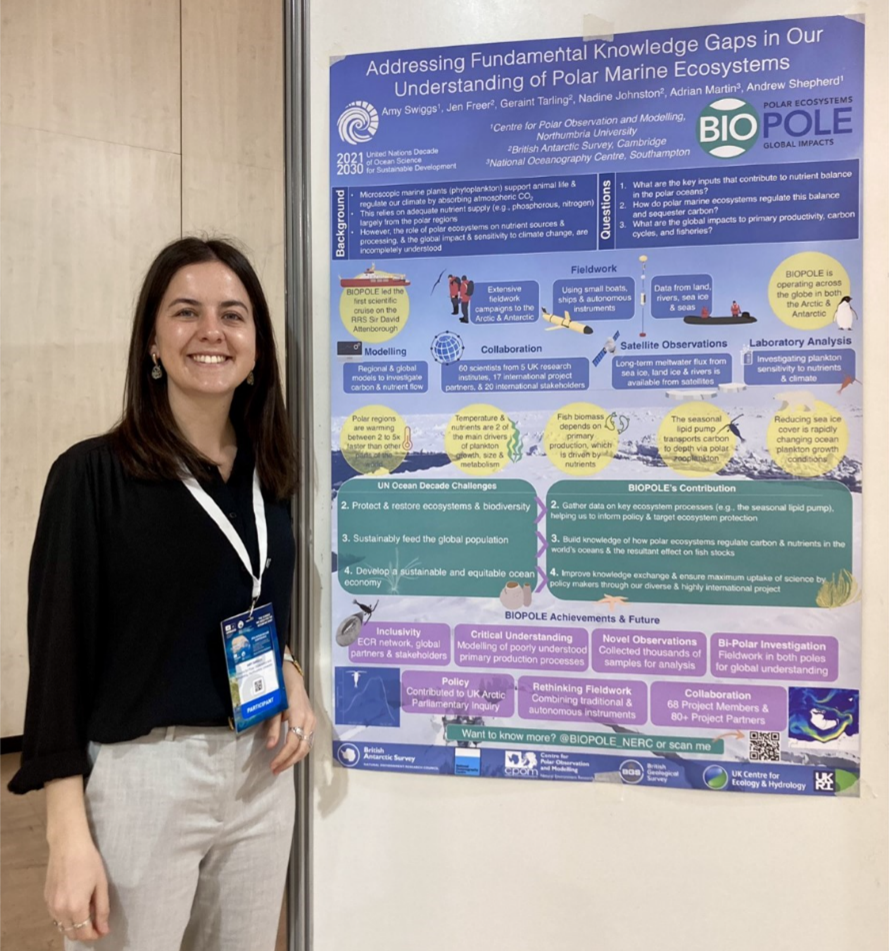Amongst 1500 other delegates from around the world, Jen Freer (BIOPOLE Project Member, BAS), Amy Swiggs (BIOPOLE Project Member, CPOM) and Nadine Johnston (BIOPOLE Project Member, BAS), were lucky enough to be selected to attend and present at the first UN Ocean Decade Conference held in April 2024 in sunny Barcelona. The vision of the UN Ocean Decade is to generate “the science we need for the ocean we want”. The aims of this conference were to bring the global Ocean Decade community together, to celebrate and take stock of progress, and set joint priorities for the future. As an official Decade Action, we were there to showcase BIOPOLE’s research efforts and highlight how our science aligns with many of the Decade’s priorities and recommendations.

We were set to work from day 1 – as soon as we passed security, found our way around the 4-floor venue and located the coffee, Amy set up her fantastic BIOPOLE poster which attracted plenty of attention throughout the week. Nadine then presented work on ICED (a BIOPOLE Strategic Partner) and participated in a panel discussion in an on-site Satellite Event ‘A decade of international action in the polar oceans. Others on this esteemed panel included Anton Van de Putte (BIOPOLE Strategic Partner, ULB), as well as Antje Boetius (director, AWI), Alfredo Giron (World Economic Forum), and Salome Mormentyn (Prince Albert II of Monaco Foundation Polar Initiative), chaired by Stephanie Arndt (AWI) and Renuka Badhe (BIOPOLE Strategic Partner, European Polar Board). This set of talks led to a fascinating discussion around the future of polar research, the ongoing need for standardised high-quality data, and even greater collaboration between nations and disciplines such as arts and humanities, where the work of BIOPOLE was also highlighted as an excellent example.


A newly drafted set of white papers detailing how to succeed in achieving each of the Decade’s 10 challenges were key talking points of the conference. To round off day 1, Jen presented a quick-fire talk as part of a parallel session dedicated to Challenge 2: protect and restore marine ecosystems and biodiversity. It was fantastic to remind the audience of the importance of the polar regions and to ensure their representation in the Challenge 2 ambitions alongside the coastal and coral reef environments.
There were more interesting talks and policy discussions on day 2 of the conference, including on developing a sustainable and resilient ocean economy, and solutions for coastal resilience. There was also time later in the afternoon to see more of sunny Barcelona and enjoy some delicious Catalan cuisine.
On the final day of the conference, we all helped to represent JETZON (the Decade Programme which BIOPOLE sits within) at the “Deepening the Decade” booth – one of many stalls within the wonderful banquet hall. This stall was organised by the Deep Ocean Stewardship Initiative (DOSI) and arguably had the most beautiful artwork to attract passers-by! Our job was to engage with delegates about the deep ocean, particularly talking about how projects such as BIOPOLE and JETZON are tackling issues in deep sea science and are leading in developments to overcome them (e.g. observing and modelling nutrients, zooplankton and carbon transport to deep waters). We had many interesting and insightful discussions with other conference members about the importance of these key climate processes. We also test ran the BIOPOLE animation led by Clara Manno (BIOPOLE Project Member, BAS).

The plenary talks from each day (including those from various Heads of State and UN special envoy for the Oceans Ambassador Peter Thomson) can be viewed again here and a short highlights video here. The main outcome of this event was the Barcelona Statement which identifies priority areas for action for the Ocean Decade in the coming years. The conference was hugely successful and a wonderful way of showcasing the fantastic work of BIOPOLE to the wider scientific community and policymakers. We enjoyed the opportunity to experience the interaction of science and policy and discuss the importance of science and communication in achieving these outcomes. Thank you to BIOPOLE for encouraging and giving ECRs the opportunity to attend such an important event.
The authors of the article – Amy Swiggs (Northumbria University), Nadine Johnston and Jen Freer (British Antarctic Survey)
